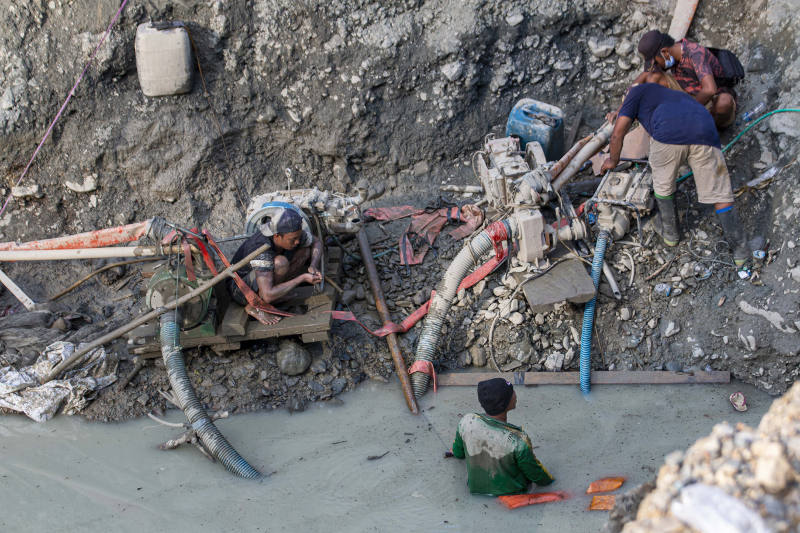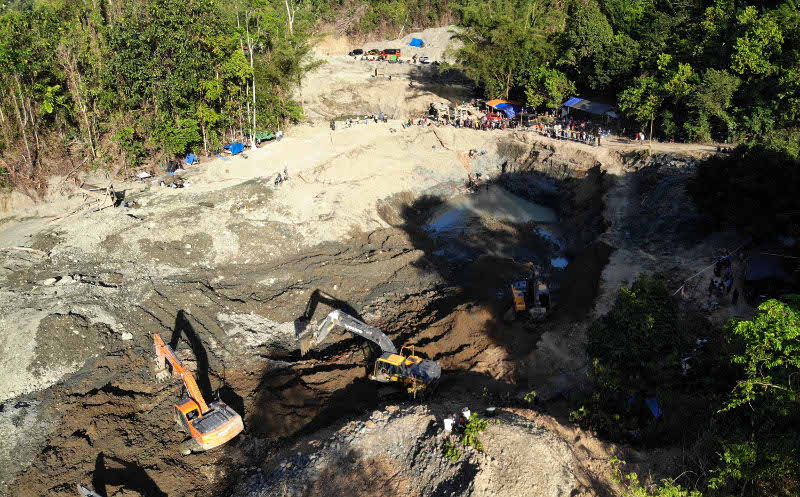Risna told how she struggled to save herself when suddenly dirt and rocks pushed into a 15-meter deep hole where she and other residents were mining for gold in Parigi Moutong Regency, Central Sulawesi, last week.
“All the panners ran, some survived to the top, but some were buried,” said Risna, a 36-year-old woman whose husband is also a gold panner, to BenarNews.
Six people were killed, 15 injured, and dozens more survived in a landslide at an illegal gold mining site in Buranga Village, Ampibabo District, Parigi Moutong Regency, on February 24, local officials said.
The incident in Buranga is a reminder of the dangers of small-scale mining work without a license, which kills dozens of lives every year throughout Indonesia.
The economic crisis caused by the COVID-19 pandemic has increasingly pushed residents to make a living as unlicensed gold miners in the absence of other jobs, observers said.
Central Sulawesi Mining Advocacy Network (Jatam) Executive Coordinator, Moh. Taufik said four other illegal gold mining locations seem to have been ignored by law enforcement officials.
The four locations are Poboya in Palu City, Kayuboko in Parigi Moutong Regency, Dongi-Dongi in Sigi Regency, and those who have just been active in Banggai Regency.
“In the past, at the illegal gold mining site in Poboya, two to three people died every year at the mining site. However, that only lasted for two to three years, after which there were no more casualties, “he said.
Taufik said that the government has never released data on the death rate at illegal gold mining locations and seems to cover it up not to attract public attention.
“Finally, there was an incident in Buranga, and all parties were shocked. Because the number of people who died was a lot, “he said.
“We seriously urge the National Police Chief to take action because this is a criminal act regulated in Mining Law number 3 of 2020 concerning mineral mining,” said Taufik.
Jatam asked the government to develop agricultural potential in areas with illegal mines so that there is no change in the profession of farmers to become miners.
The network also calls on the government to carry out an environmental impact analysis, especially if it wants to legalize a mining location.
“Because, of course, it will also harm the environment. Because usually, mining is more damaging to the environment and detrimental to the state than the benefits, “said Taufik.
Last year, the government closed 26 illegal gold mining locations in the Mount Halimun Salak National Area, which entered the Lebak Regency, Banten, after flash floods that submerged rice fields and housing areas.

Health hazard
Apart from the potential to cause landslides, other dangers lurk miners and residents in illegal gold mining locations, namely waste from mercury and cyanide as raw materials for processing gold.
Mercury is used to separating gold from the adhering layer of soil, although the chemical is illegal.
Indonesian Forum for the Environment (WALHI) activist, Eknas Sawung, said that illegal gold mining is inseparable from the use of dangerous chemicals such as mercury.
“Well, the problem is that mercury is poisonous and can cause disease, for example, minimata,” he said, referring to a neurological disease whose symptoms include numbness in the hands and feet and muscle weakness.
Eknas said that if there are areas where many babies are deformed at birth, there is usually an illegal gold mine using mercury in the vicinity of the settlement.
“Sometimes they (people in the mine) hide the disabled children for fear of being caught,” he said.
Taufik from Jatam added that there are no legal mines and imports of cyanide and mercury in Indonesia until now.
“However, the fact that there is currently, cyanide and mercury are sold freely. That means there are suppliers, sellers, and buyers. So, law enforcers must take action against this,” he said.
Head of Central Sulawesi Health Service I Komang Adi Sujendra said people exposed to mercury and cyanide could experience various health problems, including damage to the kidneys, liver, lungs, and digestive system.
“It is not immediately destructive, but in the long term, it will become a death threat, and this threat should not be underestimated,” said Adi.

Rampant during the economic crisis
In Indonesia, illegal mining activities increased when there was an economic crisis, said the principal planner at the National Development Planning Agency (Bappenas), Hasan Nugroho, in an article in The Indonesian Journal of Development Planning published in June 2020.
The COVID-19 outbreak, which has created economic uncertainty in the mining sector due to reduced export demand and supply chain disruptions, has a similar potential for this increase in illegal activity, said Hanan.
“During the COVID-19 outbreak, in several places, inspections by the authorities of Mining Without Permits (PETI) were still being carried out. However, in several other places, such as in Central Sulawesi, when COVID-19 broke out, illegal gold mining was increasingly rampant,” Hasan wrote.
Hasan said about 2 million people depend on their livelihoods from illegal mining activities in thousands of locations throughout Indonesia, most of whom work to mine gold, followed by construction and industrial minerals.
The Ministry of Environment and Forestry (KLHK) in 2018 said that the potential for state losses due to illegal gold mining reached IDR38 trillion per year and non-gold was around IDR315 billion per year. The value does not take into account the cost of rehabilitation of environmental damage caused by PETI.
“Illegal mining can provide a better income than their daily activities, especially when there is a gold rush outbreak or a spike in mining commodity prices,” Hasan wrote.
Hasan added that the government needs to reconsider the people’s mining policy by providing flexibility in licensing status.
The formalization step for these activities, he continued, must prioritize the principles of benefits and economic and social impacts at the lower levels of society and considerations of income for the state and its environmental impacts.
“Formalizing PETI activities will be an entry point for the transparency of small-scale community mining activities, including taxes/royalties that will later be paid to the government, as well as legal protection for activity actors,” he said.
Aryanto Nugroho, coordinator of Publish What You Pay (PWYP) Indonesia, a civilian coalition for transparency in the management of extractive resources, assesses that the solution to eliminating illegal mining activities is not just formalizing permits but also monitoring and government policies in providing alternative economic activities for the community around the mining area.
Aryanto said, in the 2014-2018 period, the Corruption Eradication Commission (KPK), together with the Ministry of Energy and Mineral Resources (ESDM), revoked around 3,000 problematic mining business permits.
However, post-control, the monitoring system for used land whose permits have been revoked tends to be weak, thus opening up opportunities for people to dig again.
“It’s like there is sugar; there are ants. The community saw that there was land; yes, it was used. However, where is the surveillance?” said Aryanto to BenarNews.
From an economic point of view, the government has also never made alternative activities for the community to consider, so that these illegal activities continue to exist and may increase during difficult situations such as the COVID-19 pandemic, he said.
“We see that there is no alternative to the economy for the mining area. If it’s just legalizing, that’s an instant solution. The government should have prepared other economic diversification, “said Aryanto.
Taufik from Jatam said that lower-class community groups purely run, not all community mining.
In practice in the field, Jatam often finds large investors using the people’s mining model to gain results without legal permits.
“Many of these illegal mines are owned by investors. The method is to use community mines. Because in several locations we found, much heavy equipment was prohibited from being used for community mining, “said Taufik.
Government Regulation (PP) No. 23/2010 concerning the Implementation of Mineral and Coal Mining Business Activities regulates technical requirements for community mining permits, namely the use of mechanical pumps, machines with a maximum power of 25 horsepower, and heavy equipment and explosives are not permitted.
“Meanwhile, we often find excavators in locations that are often claimed as community mines. It seems impossible for the people to rent an excavator,” he said.
Taufik said that one of the biggest problems is rampant illegal mining was weak law enforcement.
“Landslides in the mine are not the first time; they have been frequent. We have often reported it, but law enforcers, both the apparatus and the KLHK, have never followed up seriously, “added Taufik.
Energy and Mineral Resources Ministry’s spokesman Agung Pribadi did not respond when contacted by BenarNews.
‘Will be disciplined.’
The Governor of Central Sulawesi, who was elected Rusdi Mastura, admitted that he would prioritize eradicating mining without a permit when he took office.
“After we are inaugurated, controlling illegal mining will be a priority,” said Rusdi to BenarNews.
“All forms of mining need a permit so that there are no violations there. Therefore, we will collect all the data and then take action,” Rusdi explained.
Central Sulawesi Governor Longki Djanggola admitted that he had received many public reports regarding rampant illegal mining activities, including in Buranga Village.
“And we have forwarded all incoming reports to the authorities. Not only activities in Buranga but also illegal activities in other places,” said Longki to a journalist.
He explained that the Central Sulawesi Provincial Government had sent a letter to the Regional Police in February regarding a police request and legal action in Buranga Village.
“So our previous report has entered the Regional Police,” said Longki, “it would be impossible for the community to dig a hole like that if investors funded no heavy equipment,” he said.
Mining without a permit is punishable by a maximum imprisonment of five years or a maximum fine of IDR 100 billion.
Central Sulawesi Police Chief Inspector General. Pol. Abdul Rakhman Baso stated that he would take firm action against entrepreneurs if they were involved in illegal gold mining activities in Buranga Village and several other Central Sulawesi areas.
“Especially for Buranga, an investigation is still being carried out,” he told journalists.
Risna, who survived the landslide in Buranga, said that her income from panning for gold averaged 2 million rupiahs per month.
“I know it is dangerous here, and the location is not licensed, but what can you do? Only here can we work with a good income. “When I was selling fish in the market, I couldn’t make a profit like this,” she said
He admits that he will continue to work as a gold panner even though death always lurks.
“So to say it’s dangerous because it could trigger landslides, I don’t care. I think all my friends here also think the same,” she said.
Ronna Nirmala in Jakarta contributed to this article.
Source: Benar News